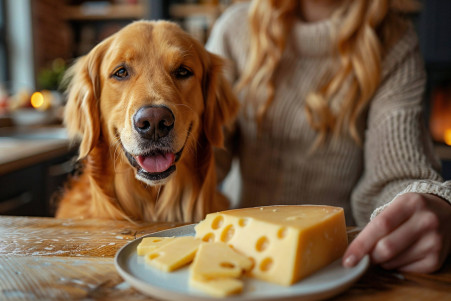Can Dogs Have Gouda Cheese? See What a Veterinary Nutritionist Says
24 May 2024 • Updated 22 May 2024

Although cheese can sometimes be a good snack for dogs, you might be concerned about whether or not your pup can have gouda, a popular type of cheese. Gouda is safe for dogs to eat in moderation. It does have some protein, calcium, and other nutrients that aren't harmful to dogs. However, it's high in fat and salt, so it should only be given to dogs in small amounts and not very often to avoid stomach upset, including vomiting and diarrhea.
We'll look at the latest veterinary research to help you understand the potential risks and benefits of giving gouda cheese to dogs. By examining information from veterinary clinical studies, toxicology research, and guidance from reputable veterinary organizations, you'll be able to determine how much gouda you can give your dog and whether or not it can be part of a healthy diet for your pet. This analysis will help you know how to responsibly give your dog this delicious snack.
Can dogs eat gouda cheese?
Nutritional Benefits and Risks of Gouda Cheese for Dogs
Gouda cheese offers some nutritional benefits for dogs, as it is a good source of protein, calcium, and other essential nutrients. However, this tasty treat also comes with potential risks due to its high fat and sodium content.
The aging process that Gouda undergoes helps reduce its lactose levels, making it more digestible for dogs with lactose intolerance compared to fresher cheeses. But even aged Gouda still contains significant amounts of fat and salt that can contribute to weight gain, obesity, pancreatitis, and other health issues in dogs if consumed in excess.
While Gouda offers some nutritional perks, moderation is absolutely key. Overindulging can lead to unpleasant digestive problems like vomiting and diarrhea. Before incorporating Gouda into your pup's diet, even as an occasional treat, it's wise to consult with your veterinarian to ensure it's appropriate for your dog's individual dietary needs and health status. With proper portion control, Gouda can be an enjoyable indulgence, but its rich nutritional profile requires an extra level of caution.
How to Practice Portion Control and Safe Serving Sizes for Dogs
The Hills Pet Nutrition website explains that because dogs are lactose intolerant, cheese should not be a regular part of their diet. The American Kennel Club also warns that cheese is high in fat and can lead to weight gain and even pancreatitis in dogs.
Hepper recommends giving dogs a small piece of gouda cheese as an occasional treat and says that cheese should never make up more than 10% of a dog's daily caloric intake. While larger dogs may be able to handle a little more gouda cheese than smaller dogs, it's still important to be mindful of portion sizes.
Dog owners should pay close attention to their dog's response to gouda cheese and stop giving it to them if they experience any digestive problems like vomiting or diarrhea. As the Pawlicy Advisor explains, some dogs are lactose intolerant or allergic to the proteins in cheese, which can cause a range of symptoms. It's important to be mindful and careful when giving dogs gouda cheese.
Symptoms of Cheese Overconsumption and Toxicity in Dogs
If a dog eats too much gouda cheese, they may experience a variety of digestive problems, including vomiting, diarrhea, and stomach upset. Per Pawlicy Advisor, some dogs may also have gas, bloating, and general discomfort due to lactose intolerance.
Even more concerning, some cheeses, like blue cheese, are toxic to dogs. Purina cautions that the mold used to make blue cheeses can produce a substance called roquefortine C, which can lead to vomiting, diarrhea, fever, and even seizures in dogs.
In addition to immediate digestive upset, feeding dogs high-fat cheeses like gouda can also lead to long-term health issues, such as obesity and pancreatitis. Rover.com notes that it's important to feed dogs cheese in moderation, as overfeeding can lead to an upset stomach.
Dog owners should pay close attention to their dogs after giving them gouda cheese and stop feeding it to them if they notice any negative symptoms. It's also a good idea to talk to a vet, especially if a dog has an underlying health condition that could be made worse by eating cheese.
Dogs with Lactose Intolerance or Pancreatitis
If your dog is lactose intolerant, they may have trouble digesting the lactose in gouda cheese, which can cause digestive upset such as diarrhea or vomiting. Dogsee notes that gouda cheese has lower lactose levels due to the aging process, which means it's less likely to cause issues for lactose-intolerant dogs than fresher cheeses. Still, gouda should be fed in moderation, and dog owners should watch their pet for any signs of intolerance.
Meanwhile, dogs with pancreatitis should steer clear of high-fat foods like gouda cheese, which can make the condition worse. As All About Dog Food points out, a low-fat, easily digestible diet is best for dogs with pancreatitis because it reduces the amount of work the pancreas has to do. Dog owners with dogs that have pancreatitis should talk to their vet about adding any kind of cheese, including gouda, to their dog's diet.
Conclusion: How to Feed Your Dog Gouda Cheese Responsibly
Gouda cheese can be a safe and occasional treat for most dogs when given in moderation. It has some nutritional value, including protein, calcium, and other essential nutrients. However, gouda is also high in fat and salt, which can lead to health issues like weight gain, obesity, and pancreatitis if consumed in large amounts.
Portion control is key when feeding gouda to dogs. The recommended serving size is a few small cubes or slices per treat, and gouda should make up no more than 10% of a dog's daily caloric intake. While larger dogs may be able to handle a bit more, pet parents should still be cautious and adjust the amount they give their dog based on their individual response.
Dogs with lactose intolerance or pancreatitis may need to avoid or severely limit their consumption of gouda cheese. The aging process reduces gouda's lactose content, which can make it easier for lactose-intolerant dogs to digest, but it's still best to limit their intake. Meanwhile, dogs with pancreatitis should be on a low-fat diet to avoid putting stress on their pancreas.
Pet parents should talk to their veterinarian before giving their dog gouda cheese and keep a close eye on their dog's reaction to the food. If they notice any negative side effects, such as vomiting, diarrhea, or discomfort, they should stop giving their dog gouda cheese. With the right portion sizes and attention to a dog's specific health concerns, gouda can be a safe and enjoyable treat for many dogs.


